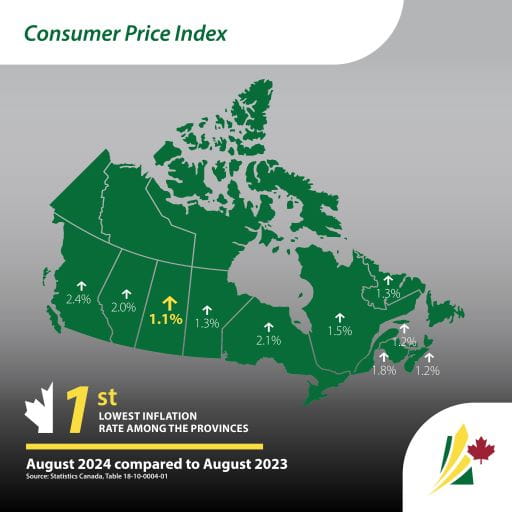Released on September 17, 2024
Carbon Tax Removal Keeps Consumer Price Index Consistently Low Among Provinces
The most recent Consumer Price Index (CPI) numbers indicate that in August 2024, Saskatchewan's CPI saw an increase of just 1.1 per cent over August 2023. This is the lowest year-over-year inflation increase among the provinces and well below the national average of 2 per cent.
"Saskatchewan has the lowest inflation rate in Canada as a direct result of our government's refusal to collect and remit the carbon tax," Trade and Export Development Minister Jeremy Harrison said. "We will continue to provide necessary relief for Saskatchewan families, while fighting back against the Trudeau/NDP coalition government as they threaten to have the Canada Revenue Agency unconstitutionally garnish money from our province's taxpayers. Our government will always stand up for Saskatchewan people."

The CPI measures changes in the price of goods and services over time. Inflation is indicated by the growth of CPI, which helps assess changes to the cost of living. An individual's ability to buy goods and services is affected by changes in income and prices.
Statistics Canada's latest GDP numbers indicate that Saskatchewan's 2023 real GDP reached an all-time high of $77.9 billion, increasing by $1.2 billion, or 1.6 per cent. This places Saskatchewan second in the nation for real GDP growth, and above the national average of 1.2 per cent.
Private capital investment is projected to reach $14.2 billion in 2024, an increase of 14.4 per cent over 2023. This is the highest anticipated percentage increase in Canada.
The province recently released "Securing the Next Decade of Growth: Saskatchewan's Investment Attraction Strategy," in conjunction with the launch of the investSK.ca website. These initiatives are positioned to amplify growth in Saskatchewan, serving as pivotal instruments in driving further development.
-30-
For more information, contact:

